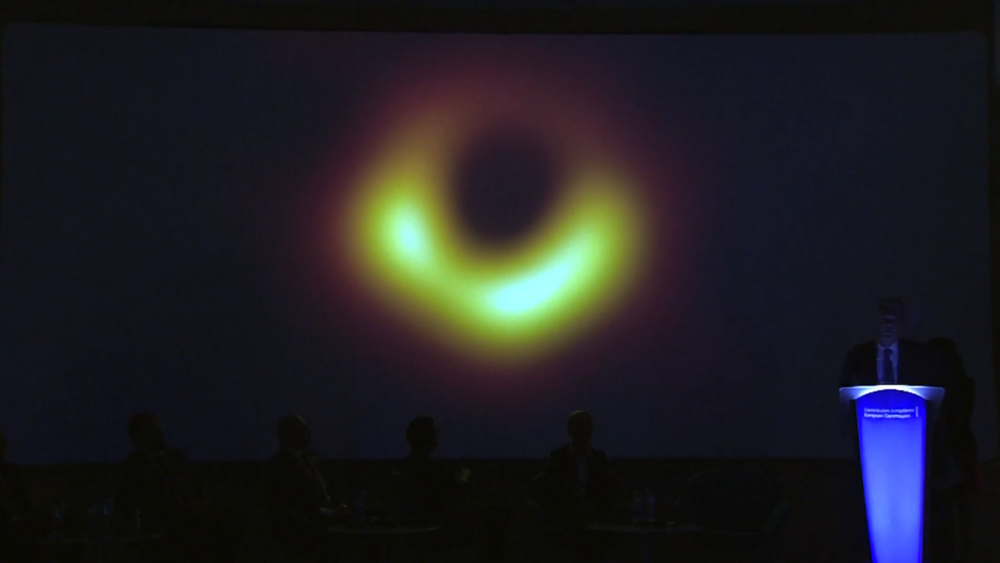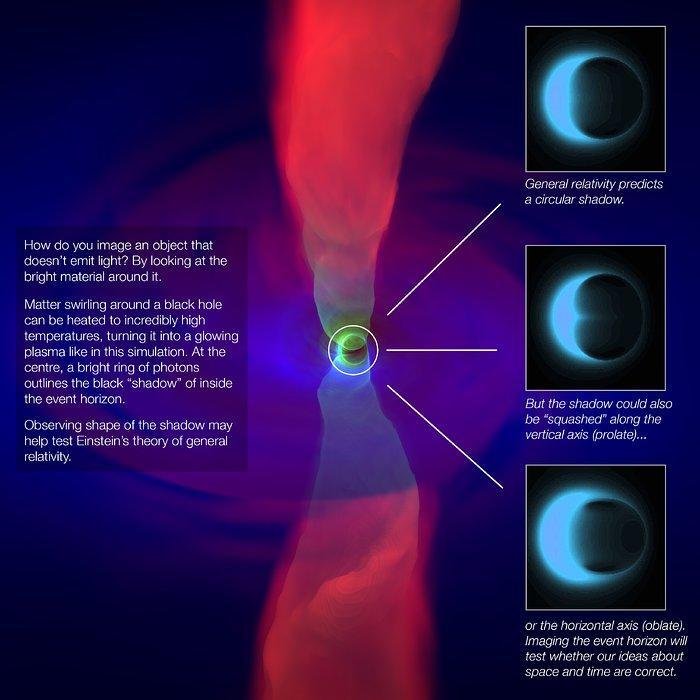-
Posts
9 -
Joined
-
Last visited
-
Days Won
1
Content Type
Profiles
Forums
Events
Posts posted by Elendirs
-
-
-
"On April 10th 2019, the Event Horizon Telescope (EHT) Collaboration will present its first results in multiple simultaneous press conferences around the world, and many satellite events organized by its stakeholder and affiliated institutions. Press conferences will be held simultaneously in Brussels (in English), Lyngby (in Danish), Santiago (in Spanish), Shanghai (in Mandarin), Tokyo (in Japanese), Taipei (in Mandarin), and Washington D.C. (in English), starting at 13:00 Universal Time [...] Major press conferences will be streamed live online via the following channels:
- Brussels: European Comission Youtube Channel
- Tokyo: National Astronomical Observatory of Japan channels on Youtube and Niconico
- Washngton: National Science Foundation Live Stream "
Simulations and expected results can be found here : https://eventhorizontelescope.org/simulations-galleryMore informations : https://eventhorizontelescope.org/science
What do you think/expect, are you excited ? I surely am!
4 -
24 minutes ago, studiot said:
Yes it's possible to achieve a realistic overview, but remember that even Physicists specialise so don't expect to cover it all.
This leads nicely to the following suggestion.
There have been a number of series of slim monographs from various publishers on a particlar topics in Physics.
Cambridge University and Oxford University both do one, but they are both quite demanding on the Mathematics (they have some mongraphs for that as well)
Other publishers have some easier ones eg this one from Routledge
https://www.amazon.co.uk/Relativity-Physics-Student-R-Turner/dp/0710200013
The series includes Quantum mechanics, Electricity and Magnetism and Classical Mechanics, EM waves which are all good.
Allen and Unwin have a good series in mathematics like this.
These books can be obtained second had quite cheaply and you can alsway ask here for more detailed help.
As a biomedical person I also include this book as it compares how Nature and Man achieve similar mechanical objectives in the real world, non mathematically.
Just to round it all off, I would accompany this with a good all round general physics book such as
Thanks, i will give a look !
0 -
This question would need a whole book to be answered.
In short: there are many types of brain injuries associated to memory problems such as : stroke,brain turmors, head trauma,cerebrovascular disorders, cerebral infections and others. Also a lot of others patologies such as Alzheimer disease or dementia ( just to name two of many ) can cause memory loss.In order to have strong memory problems, usually, there are three main areas that mainly needs to be damaged ( note that the type of damage and the area where it happens can determine many different deficit) :
1. Mid-Dorsal Nucleus of the Thalamus
2. Mamillary bodies
3. Hippocampus
All of the above are neuropsychological diseases caused by brain injuries that do not occur normally.
Memory loss can occur also with age ( the age at which they occur mostly depends on the individual lifestyle), and its usually caused by the deterioration of neural synapsis in the brain. Note that recent studies show that intellectual activities, physical activities and general learning can drastically reduce normal memory loss.2 -
Hello, i am a student of Neuroscience at University. I love neuroscience and science in general, in particular Physics: i love to question the base of reality and it's mechanism. This passion made me explore Physics by reading famous books of great scientist and communicators like Neil DeGrasse Tyson, Lawrence Krauss, Brian Green, Stephen Hawking etc. But now, i realised I would like to learn things more deeply, expecially the match behind it, unfortunately it is impossible for me to start a new University degree in Physics, i would do that ( if i had another life to live )but my career in neuroscience would be impacted.
Is it possible to learn Physics and Theoretical Physics alone, self learning it ? No matter if this will take 5-10-20 years. How do i start ? What do i do ?
I would love to hear some advice.
Greetings,
Massimo.
P.S. My knowledge of Mathematics and Classical Physics is basically 0, i know statistic quite a bit and it's application in brain research.0 -
3 minutes ago, beecee said:
Do you accept that electric/magnetic fields exist?
Yes i do.
0 -
6 minutes ago, Strange said:
I would add that the "nature" of time is not really a physics question. In the mathematics of relativity, time is a dimension. This allows us to build useful models to describe how the universe behaves.
Thanks for your answer, i have a lot of material now to think about. On this last point i strongly disagree, i think the understanding of the nature of time should be central in understanding the context in which we live and i think there is much more to be discovered and described than just a mathematical use of it.
0 -
4 minutes ago, Strange said:
Because time is a dimension, anything you can say about time applies to the other dimensions, eg. length. So does length need to be composed of something? A "lengthon"?
Honestly i don't think lenght exists outside our brain. The problem i can't understand is how can time be something, like it must have a composition in order to exist, it must be made of something right ?
0 -
18 minutes ago, studiot said:
So don't throw out zero time duration or zero events in a non zero time duration.
The Science of stasis or statics is very important in our world.
Thanks, i understand what you mean and it's something i haven't considered too much. What are your opinions on the composition orthe structure of time ?
0 -
Greetings to everyone, i am new here so please excuse any errors i did in posting this thread. ( Please also excuse my english ).
First off i would like to say i am just a young science lover with no deep understanding of anything in physics, which i love and try to explore in every way possible.
One concept i've always been interested in is time. Initially, as everyone i suppose, i viewed time as an absolute and costant background in which events happened. After reading many books about Einstein and the theories of relativity my newtonian view changed and time started for me being "something", i immagined time as a texture of reality and of space (to be honest i could'nt immagine time existing without space, which i always represent, probably in a wrong way, in my mind as made of Calabi–Yau extra dimensions described by string theory ). In the past couple of years however, i started questioning the existence of time itself :
1) How can time be described without movement or changes ? A white ball in a black space with nothing else made for me impossible to describe time if not as a curvature of the einstein fabric of space-time. I would need 2 balls to describe time properly by having reference points.
2) If time exists, it would need to be composed of something let's say a particle which i call "Timeon". Well that particle of time would need to exist in a time in order to be described as existing. How can that happen ? The same thought can be applied when viewing time in the Einstein way.
Seems to me now that time dosen't exist, it is just a model which our brain uses to describe changes. This would mean Einstein and its incredibly empirically proven theories would be a wrong description of something else , which is a big sentence to say and one aspect i can't resolve.
What am i missing?
Sorry for any blasphemy i might have said, i am just trying to understand.0





First real Black Hole image - 10 April 2019
in Astronomy and Cosmology
Posted
Thanks for the correction, it is an honor for me to be alive in this time!